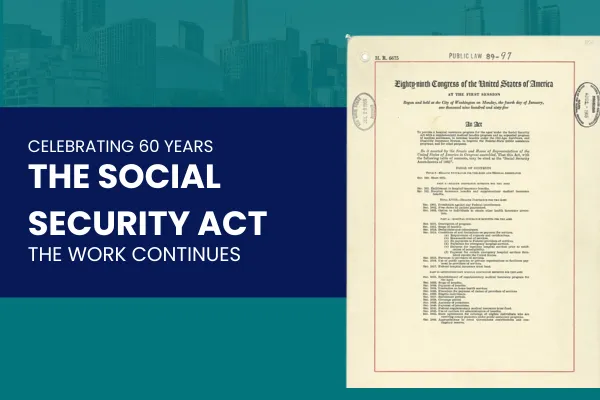
60 Years of Medicare & Medicaid: A Legacy of Care, A Call for Renewal
Sixty years ago, the U.S. took a bold step toward collective health with the passage of the Social Security Amendments of 1965—giving life to Medicare and Medicaid, and creating the first real public promise of care for those too often left out.
Where We Started: Health as a Byproduct of Work
For most of the 20th century, access to healthcare in the U.S. was accessed as a benefit. Employer-based insurance became the norm, not by design but by default. During wartime and the industrial boom, health coverage was used to recruit labor. Unlike peer nations that embraced government-run systems, the U.S. nurtured a culture that empowered health insurance coverage to be intricately linked to employment status.
One of the most influential figures of this era was Henry J. Kaiser, a shipbuilder and industrialist whose work on massive projects like the Hoover Dam taught him a key lesson: a healthy workforce was essential to productivity. He partnered with Dr. Sidney Garfield to launch a prepaid medical care system for his workers—what would eventually become Kaiser Permanente. As Dr. Sidney Garfield said and Kaiser would champion, “Health care should be provided as a right, not as a privilege”.
1965: A New Social Contract
After decades of grassroots pressure and political resistance, President Lyndon B. Johnson signed the Social Security Amendments into law on July 30, 1965. With former President Harry Truman by his side, who had proposed national health insurance 20 years earlier, Johnson declared Medicare and Medicaid the foundation of a broader vision of justice: healthcare that doesn’t depend on your income, job, or age.
Medicare was designed to serve older adults. Medicaid aimed to cover people with low incomes. Together, they acknowledged that access to healthcare is a public commitment.
Progress and Gaps in a Global Context
Despite this progress, the U.S. remains the only high-income country without universal coverage. According to a 2023 Commonwealth Fund report, the U.S. spends nearly twice as much on healthcare as peer nations, yet ranks last in access, equity, and health outcomes. Our model is still heavily tied to employment, which leaves many, including shift workers, caregivers, part-time employees, and more caught in the gap between too much to qualify for Medicaid and too little to afford private insurance.
The ACA’s Expansion—and Its Fragility
The Affordable Care Act of 2010 sought to address these gaps by expanding Medicaid eligibility and creating marketplaces with subsidized coverage. Millions gained access. Still, it was a fix—not a full transformation.
Now, with the passage of H.R. 1, we are poised to see coverage rollbacks, especially within Medicaid. Redeterminations and funding cuts will push people out of the system. Many of those affected are working—but not enough hours, not at the right jobs, or not making enough to buy insurance outright.
Why This Anniversary Demands More Than Celebration
As we mark 60 years of Medicare and Medicaid, we celebrate their lifesaving reach—but we must also reckon with their limits.
Medicare and Medicaid were never the finish line. They were footholds on a larger climb toward universal care. We are not there yet. And in the wake of H.R. 1, we risk sliding backwards—shrinking our safety net when we should be expanding it.
The Road Ahead: Reclaiming and Redesigning Access
True health justice means rewriting our healthcare story—not around eligibility thresholds, but around human dignity. It means ensuring that where you work—or whether you work—doesn’t dictate whether you can heal. It means building policy rooted in care, not conditions.
As we look toward 2026 and beyond, we must bring more voices into the conversation, especially those most affected by coverage loss. Policymakers, community leaders, and advocates must co-create systems that reflect real life, not red tape.
Call to Action
Let this anniversary be a turning point, not just a tribute. Let us honor the legacy of Medicare and Medicaid by protecting what we’ve gained, and demanding what we still deserve: care that covers us all, no matter our job title, zip code, or income bracket.
Citations:
Henry J. Kaiser: America's Health Care Visionary. Kaiser Permanente. https://about.kaiserpermanente.org/who-we-are/our-history/henry-j-kaiser-americas-health-care-visionary
Medicare and Medicaid Act of 1965. U.S. National Archives. https://www.archives.gov/milestone-documents/medicare-and-medicaid-act
U.S. Health Care from a Global Perspective, 2022. Commonwealth Fund. https://www.commonwealthfund.org/publications/issue-briefs/2023/jan/us-health-care-global-perspective-2022
